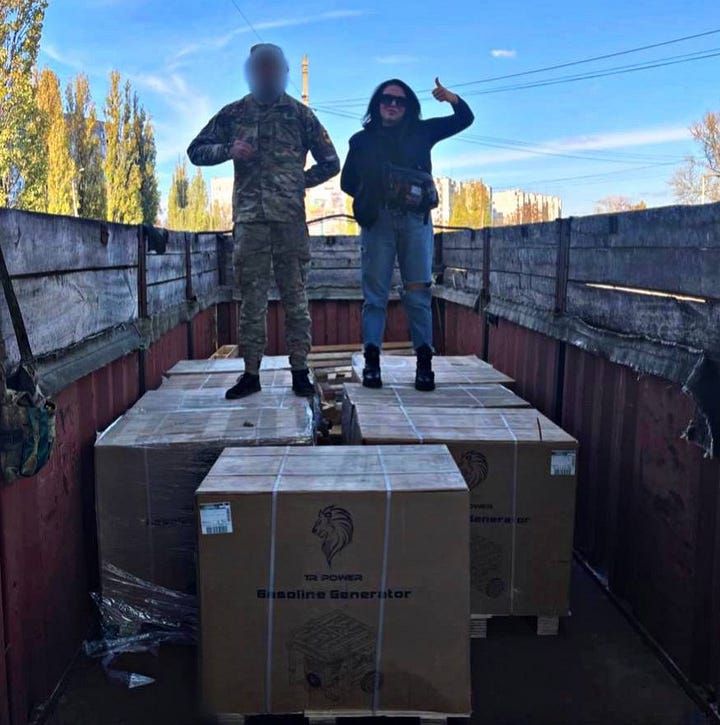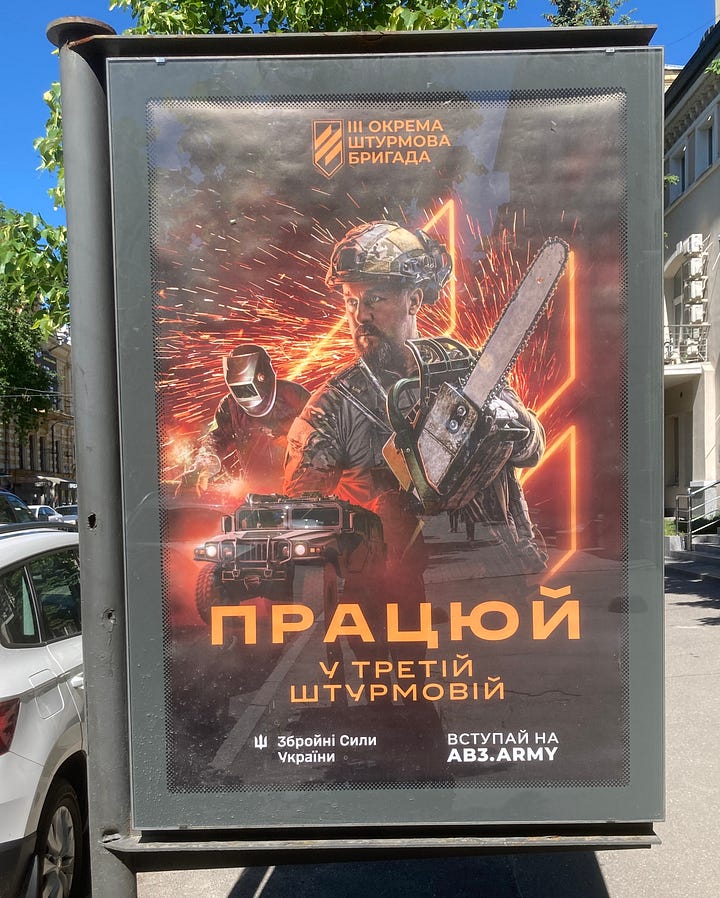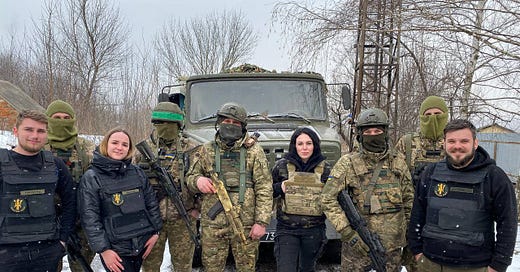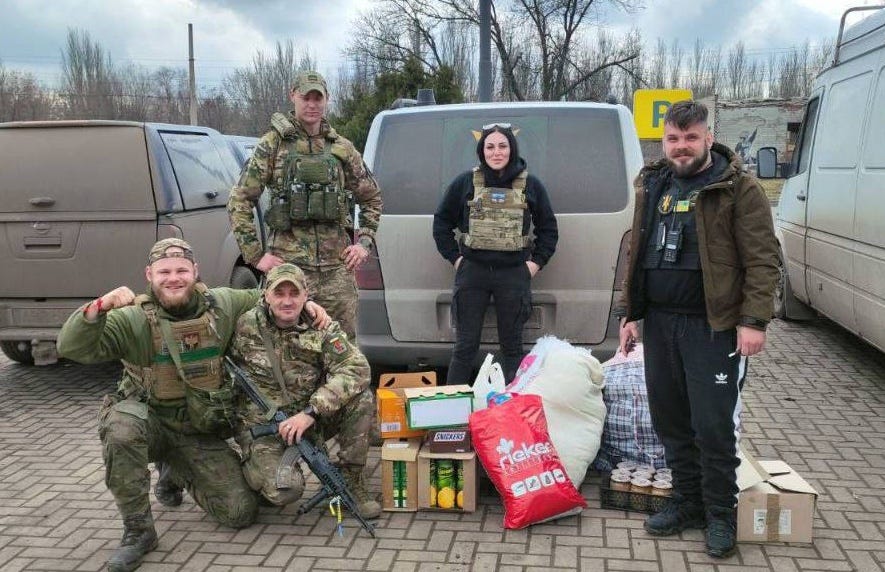Our collective future possibly depends on the Ukrainian army. If their country falls, the Russian war machine will move on to the rest of Eastern Europe, increasing instability in the rest of the world. Lucky, then, that Ukrainian soldiers have turned out to be tougher, more determined and more resourceful than most of us dreamed as possible. (We just have to supply them enough weapons…)
But what precisely does it mean to be ‘in the army’ or ‘at the front’? Look away now if you’re a professional; but this is well outside the experience of most Westerners. One of my previous interviewees, Anya, is married to a member of the Azov battalion and devotes herself full time to fundraising for Azov and other brigades. So I asked her to tell me some of the basics about how the army functions.
Me: What is the ‘front line’?
Anya: Brigades have different purposes, and different kinds of troops. [Anna’s note: google ‘Ukrainian brigades’ for vast amounts of information.] There are artillery, there are infantry, there are reconnaissance brigades, and they each do a specific task. For example, mortar brigades go to the front line and shoot, then come back and sleep at the second line. It’s the same for intelligence: they live on the second line, go out and do their job and come back. Often on the second line they live in empty local houses, or with the locals. In Kherson and Donbas we often meet people who live like that.
Sometimes stormtroopers go to the front line, then come back and rest and eat for a couple of days. Then they have a few days’ training and then they go back. The ones who spend longest actually on the front line are the infantry, the regular army who come along once the stormtroopers have taken territory. They dig trenches, and spend a long time down there. Generally two weeks, then another group comes.
And further back?
Brigades have a lot of different jobs. In the rear, at headquarters, in the bureaucracy. If a brigade is doing things right, they have a lot of equipment, a lot of people, and a lot of supplies, and there are a lot of different jobs in the brigade. There are accountants, there are lawyers, there is the armoury department.
There are cooks who work right there on the front line, in the field kitchens. There drivers, and people in charge of sourcing and delivering food. After many years of war, we’ve got this bureaucracy! If a brigade is honest, if nothing is stolen, if everything is right, and so on, then they will have a lot of people with their own assigned tasks.
How do Ukrainian soldiers view the enemy?
War is work. Your job is to destroy your opponent. They don’t say ‘kill’, they say ‘destroy’. You went out and you destroyed your enemy, great job!
A lot of our commanders say that the enemy should be respected. And there are lots of stories about Russians being taken prisoner and worried we would laugh at them, or worse. When a person is unarmed, he will not be shot. Of course. I feel sorry for the non-convicts [Anna’s note: Russia often recruits from prisons, including violent offenders]. They’re captured and they sit there round-eyed saying, what, you’re not going to beat us?
I know that we have conscripts in Ukraine, but none of them are on the front line. Russia sends eighteen-year-olds to the front line.


How are wounded soldiers evacuated?
Every brigade and every medic work in their own way. But in the course of the war, we’ve developed strategies. The brigades I help have a commander who sits near the HQ, and when someone is wounded, if he’s a good commander with a low mortality rate, he radios the doctors that he has an injured soldier and they should come.
A lot of people think that the ambulance will come to take the soldier, but it's not like that. Some armoured personnel carrier comes, maybe an armoured pickup or Jeep, which takes the lads from there to a certain point where they get first aid. Then they’re taken further by ambulance.
Are there desertions?
Yes, a lot of people at the moment. It all depends on the commanders, on what kind of brigade you’re in, and so on.
There are some really cool teams, in Azov, for example, where you have all your rights. Nobody wants to leave those because there’s a decent attitude, in principle. Our lads are allowed to take a holiday abroad once a year. [My husband and I] went to Italy, and we came back, because there are good commanders, good conditions. Why would you leave somewhere you’re appreciated, where you get a salary?
The human factor is also important, of course. Sometimes when guys come, they think they are strong and cool but it turns out no, they’re afraid and run away. That’s war.
Why are Azov so beloved in Ukraine?
Because they are regular guys from our back yard. I grew up in Mariupol and I saw a lot of guys I know join Azov, and for us it was cool to hang out with them and be friends with them, because they’re decent, honest guys.
Originally they had their own closed club, where not everyone was allowed. But when the war came in 2014, these lads who everyone had called hooligans and so on, they were amongst the first to stand up for the country. Even though they had no weapons and no understanding of war.
Now it’s a huge brigade, and young guys really want to join it. There are no old commanders in Azov. All our commanders are young, they are literate, they are very serious guys. And it’s understood that this is not the Soviet army with some old general issuing commands from headquarters and so on. You have a commander who will stand with you and shoot. That's cool.


One thing you cannot fail to notice on the streets of Ukraine’s cities are recruitment posters for the Azov battalion. I took these pictures in Kharkiv in May 2024. The one on the left asks ‘ARE YOU WITH US IN THE THIRD STORM BRIGADE?’ (Azov) and on the right, you are urged to ‘WORK IN THE THIRD STORM BRIGADE’. Why does Azov advertise? It’s much the same as with brands in the West. They have the money to advertise their status, which attracts the cream of applicants, which maintains their status, which maintains financial support, and you have a genuinely elite force that people look up to and have faith in.
How do people in Ukraine regard the Kursk offensive?
It’s great! Well, that’s my personal opinion, I can’t speak for everyone.
We fought head-to-head for a very long time. And how much did we win? Eleven kilometres of front line. So many guys died. And it was absolutely unjustified.
And a long time ago, the commanders of Azov said we need to learn to fight not with men, but with minds. In Kursk, we haven’t spent a lot of people. We’ve captured a huge area and if we keep going, part of Kursk oblast will be ours. Then there will be a basis for negotiations, because we’ll have the cards in our hands.
And that’s a war of minds.
I’m going back to Ukraine in mid-September, initially to Zaporizhzhia; this will probably be the last post until then, but watch this space.






Thanks for info. I now have better understanding why I see on other platforms requests from soldiers for equipment. I had wondered how their military tolerated so many different potential equipment standards.
I see that this blog is now lively with comments. I am not going to enter into the politics of the situation, but just to put in my two pennies: my opinion and my hope (if only...) would be in the first instance *immediately* to stop hostilities and *then* discuss matters until a peaceful solution can be found. Also, my reasoning is that past mistakes and past injustices can hardly be retroactively fixed: limiting the discussion to the present and only the present may perhaps open a way to let go of the intolerable weight of the past, and step forward into a more reasonable future. But I am speaking from a situation of peace and comfort here so it's all too easy for me to preach =(
As always, my wishes and my thanks to Anna for putting herself on the line in more ways than one.